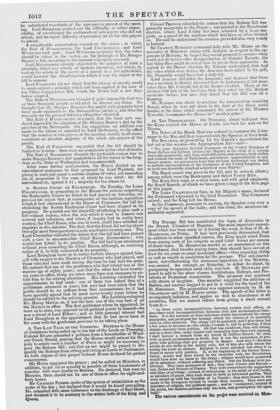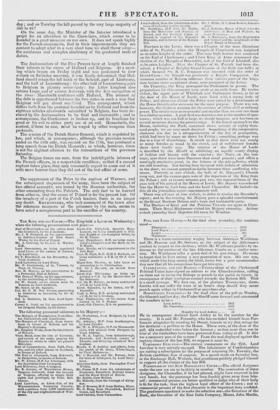The Peerage Bill has constituted the topic of discussion in
the French Chamber of Deputies. The most important amend- ment which has been made in it during the week, is that of M. de MOSBOURG, on Friday. It had been previously determined, that in addition to other specified classes, the King might select Peers from among such of his subjects as paid 3,000 francs per annum of direct taxes. M. MOSBOURG moved as an amendment on this amendment, that besides paying taxes, they should have served at least for six years in some municipal office,—thus requiring ability as well as wealth in candidates for the peerage. This sub-amend- ment, notwithstanding the strenuous opposition of the Ministry, was carried. An attempt, on Saturday, to defeat its object, by postponing its operation until 1836, was lost. M. MEYNARD pro- posed to add to the other classes Archbishops, Bishops, and Pre- sidents of Protestant consistories. The proposal was received with shouts of laughter. One member suggested the addition of Rabbis, and another begged to put in a word for the head of the St. Simonians. The proposition was opposed seriously by M. de GRAMMONT and by M. DUPIN senior. The speech of the latter is so singularly judicious, and applies so well to churchmen in all countries, that we cannot refrain from giving a short extract from it:— " As there exists incompatibilities between certain civil offices, so does there exist incompatibilities between civil and ecclesiastical func- tions. It is the mixture of these functions which has rendered the clergy unpopular, and paralysed the homage which the virtues of its members have so often deserved. The clergy will be powerful, and! give them but a few years to become so—the clergy, I repeat it, will be powerful, if they abstain sincerely from politics. On that one condition, they will obtain, and in a short time, more respect and veneration than they ever enjoyed, I shall borrow a remark from my friend M. Odillon Barrot : he said, with as much profoundness as truth, that it was the association of pro- perty with privilege that put property in danger. And why 1—Because people do not strike at the enemy only, but at him also with whom the enemy has made an alliance. Religion is never attacked but when it is found in union with politics. If, at the beginning of the former Revo- lution, priests had been found in the churches only, the Revolution would have done no harm to the clergy ; religion would have preserved all its splendour, without suffering any attack. But the Bishops were po- liticians. They were possessed of fiefs; they were Counts and Barons— nay, Dukes and Princes of France. They were everywhere the supporters and allies of privilege ; instead of interposing, in the midst of civil broils, as ministers of peace, they took share in them as interested parties. They were mixed up with the troubles of La Vendee; they were found in the ranks of the foreigners invited to invade their country. They were not ministers of religion, but political agent:. and in —msequence, instead of the priest, the factious partisan only was seen, and proscription fell upon both."
The various amendments on the projet were received on Mon.
day ; and on Tuesday the bill passed by the very large majority of 386 to 40!
On the same day, the Minister of the Interior introduced a projet for an alteration in the Corn-laws, which seems to be founded in a great measure on our own. It does not speak highly for the French economists, that in their improvements they are content to adopt what in a very short time we shall throw away— the cumbrous and complex machinery of the graduated scale of duties.



























 Previous page
Previous page